Polycystic Ovary Syndrome (PCOS) or Polycystic Ovary Disorder (PCOD) is a common hormonal disorder among women of reproductive age. It affects the ovaries, leading to an imbalance of hormones which can cause a variety of symptoms. This condition is characterized by irregular menstrual cycles, excess androgen levels, and polycystic ovaries. Women with PCOD often struggle with issues like weight gain, acne, and excessive hair growth. Traditional treatments include medications and lifestyle changes, but Ayurveda offers a holistic approach that targets the root cause of the disorder. Ayurvedic treatment for PCOD focuses on balancing the body's doshas, improving digestion, and enhancing overall well-being through natural remedies and lifestyle modifications.
What Is PCOD/PCOS
PCOD, also known as PCOS, stands for Polycystic Ovary Disorder or Syndrome. It is a hormonal disorder that affects millions of women worldwide. The condition is marked by the presence of multiple small cysts on the ovaries, which can lead to various symptoms such as irregular menstrual cycles, infertility, and metabolic issues. PCOD is caused by a combination of genetic and environmental factors. The hormonal imbalance results in the overproduction of androgens (male hormones) which can interfere with the normal functioning of the ovaries. This disorder not only impacts reproductive health but also increases the risk of developing diabetes, heart disease, and other long-term health issues.
Symptoms Of PCOD
- Irregular Periods: Women with PCOD often experience irregular menstrual cycles, with periods that are infrequent, prolonged, or absent altogether.
- Excess Hair Growth: Also known as hirsutism, this symptom involves excessive hair growth on the face, chest, and other parts of the body, caused by high levels of androgens.
- Acne: Hormonal imbalances can lead to severe acne, particularly on the face, chest, and upper back.
- Weight Gain: Many women with PCOD struggle with weight gain and have difficulty losing weight due to insulin resistance.
- Thinning Hair: Hair thinning or male-pattern baldness is another common symptom resulting from hormonal imbalances.
- Darkening of the Skin: Dark patches, particularly on the neck, groin, and under the breasts, are often seen in women with PCOD.
- Fertility Issues: PCOD can cause infertility due to irregular ovulation or lack of ovulation.
Main Reason Behind PCOD
The exact cause of PCOD is not fully understood, but it is believed to be a combination of genetic and environmental factors. Here are the main reasons:
- Genetic Predisposition: A family history of PCOD can increase the risk of developing the disorder.
- Insulin Resistance: Many women with PCOD have insulin resistance, leading to higher insulin levels, which can increase androgen production and interfere with normal ovulation.
- Hormonal Imbalance: Elevated levels of androgens and luteinizing hormone (LH) disrupt the normal menstrual cycle and ovulation.
- Inflammation: Chronic low-grade inflammation is common in women with PCOD and can contribute to increased androgen levels.
Ayurveda For PCOD
Ayurveda offers a holistic approach to managing PCOD by focusing on balancing the body's doshas (Vata, Pitta, and Kapha), improving digestion, and enhancing overall health. According to Ayurveda, PCOD is caused by an imbalance of Kapha and Vata doshas, leading to the accumulation of toxins in the body. Ayurvedic treatments aim to detoxify the body, regulate hormonal balance, and improve reproductive health through natural remedies, dietary changes, and lifestyle modifications.
PCOD Ayurvedic Treatment
- Herbal Remedies: Herbs like Ashwagandha, Shatavari, and Licorice help balance hormones and reduce symptoms of PCOD.
- Panchakarma Therapy: Detoxification treatments such as Virechana (purgation) and Basti (medicated enema) cleanse the body and remove toxins.
- Dietary Changes: A balanced diet rich in whole grains, fruits, vegetables, and lean proteins helps manage weight and improve insulin sensitivity.
- Yoga and Exercise: Regular physical activity, including yoga, helps reduce stress, balance hormones, and maintain a healthy weight.
- Stress Management: Techniques like meditation and pranayama (breathing exercises) help manage stress, which is a significant contributor to hormonal imbalances.
- Lifestyle Modifications: Establishing a regular routine for eating, sleeping, and exercising supports overall health and hormonal balance.
- Use of Ayurvedic Supplements: Ayurvedic supplements like Kanchanar Guggulu and Chanderprabha Vati support ovarian health and hormonal balance.
Ayurveda Diet For PCOD
- Whole Grains: Incorporate whole grains like quinoa, barley, and oats to improve insulin sensitivity and provide sustained energy.
- Fresh Fruits and Vegetables: A diet rich in fresh fruits and vegetables supplies essential vitamins, minerals, and antioxidants that support hormonal balance.
- Healthy Fats: Include sources of healthy fats like avocados, nuts, seeds, and olive oil to reduce inflammation and support overall health.
- Lean Proteins: Opt for lean proteins such as legumes, lentils, and tofu to maintain a healthy weight and support muscle health.
- Spices and Herbs: Use spices like turmeric, cinnamon, and fenugreek in cooking to enhance digestion and reduce inflammation.
- Hydration: Drink plenty of water and herbal teas to stay hydrated and support detoxification processes.
- Avoid Processed Foods: Minimize the intake of processed foods, sugary snacks, and refined carbohydrates to maintain stable blood sugar levels.
Conclusion
PCOD is a complex hormonal disorder that affects many aspects of a woman's health. While conventional treatments are available, Ayurveda offers a holistic approach that addresses the root cause of the disorder. By balancing the body's doshas, detoxifying the system, and promoting a healthy lifestyle, Ayurvedic treatment can effectively manage PCOD symptoms and improve overall well-being. Incorporating Ayurvedic principles such as herbal remedies, dietary changes, and stress management techniques can help women with PCOD achieve better hormonal balance and enhance their quality of life.












